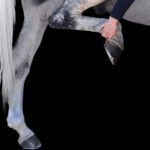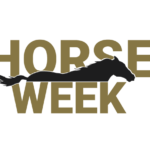August 27, 2008 — Following a routine drug test on August 19 at the 2008 Olympic Games in Hong Kong, Harmony’s Mythilus, a U.S. dressage horse, ridden by Courtney King-Dye, was found to have tested positive for felbinac. Felbinac is considered a class A prohibited substance by the Fédération Equestre Internationale (FEI). Felbinac is usually applied topically for the relief of local pain and inflammation and belongs to a group of medicines called non-steroidal anti-inflammatory drugs (NSAIDs).
When Mythilus arrived in Hong Kong he was treated in the Hong Kong Jockey Club Clinic for artrial fibrillation as a result of stress from his trip. U.S. Equestrian Federation (USEF) Veterinarian Dr. Rick Mitchell attended to the horse in close cooperation with the Veterinary Commission. King-Dye and Dr. Mitchell believe that during treatment at the clinic, he may have come in contact with Felbinac. In discussion with King-Dye, USEF vets, grooms and physical therapists, no other explanation or conclusion was able to be drawn.
“Neither I nor my vets had ever heard of the drug Felbinac until we got the call about Myth’s positive test,” said King-Dye. “We were stunned and baffled. We spent the entire day doing Internet research on the uses for this drug and how it could possibly have gotten into my horse’s system. As far as we could find it is not even manufactured, approved or available in the U.S. My horse has had no soundness problems whatsoever, and I would have no need for an anti-inflammatory. Anyone who knows me knows wholeheartedly that I would never dope my horse intentionally. It is cheating; it is not putting your best against the other’s best. I have never been in a more torturous and frustrating situation; trying to prove innocence is very hard. It saddens me beyond description that my whole reputation could be blackened because of this situation.”
The FEI Tribunal stated in their preliminary decision that “there are circumstances in this case that makes it difficult to clear out how the prohibited substance entered into the horse’s system.”
“The USEF stands behind the FEI’s initiatives to rid the sport of doping and to protect the welfare of our horses. We are equally supportive of Courtney in this situation as this substance was unknown to any of us until a few days ago,” said USEF CEO John Long. “It seems clear that Mythilus came into contact with it without Courtney’s or Dr. Mitchell’s knowledge.”
King-Dye, who placed 13th individually in the dressage competition, was officially notified on the morning of August 22 of the positive test result and the decision for provisional suspension was upheld that evening at a preliminary hearing before one member of the FEI Tribunal.
Given that the dressage events of the 2008 Olympic Games ended on August 19, it was decided to wait until the confirmatory B analysis prior to any public announcement of the findings. The FEI has now received confirmation of the initial finding from the analysis of the B sample.
The FEI also received confirmation that the B samples for the four show jumping cases of the presence of the banned substance capsaicin have all yielded positive test results, thus confirming the initial positive findings from the A samples. This involves:
Rider/Horse
Bernardo Alves (BRA)/Chupa Chup
Christian Ahlmann (GER)/Cöster
Denis Lynch (IRL)/Latinus
Tony Andre Hansen (NOR)/Camiro
Now that the B samples have confirmed all the initial findings, the process will follow the Accelerated Medication Control Procedure during and after the 2008 Olympic Games which is part of the FEI Regulations for Equestrian events at the 2008 Olympic Games (Annex G), available on the FEI Olympic website.
Evidence and written submissions have been requested from each rider, and a three-member panel of the FEI Tribunal has been appointed. Hearings will be held September 5-7 in Lausanne, Switzerland, however, it is up to the people responsible whether or not they wish to exercise or waive their right to be heard. The panel will then, in light of all the evidence received, take a decision as to the applicable sanction, if any.
An update will be provided by the FEI following the hearings (September 8) and final decisions will be announced prior to the end of the first week in October, provided the hearings can be held as scheduled. However, these deadlines are indicative timelines, and may be affected by specific circumstances as with any legal proceeding. The competition results will be amended as indicated in the Tribunal’s final decision.





